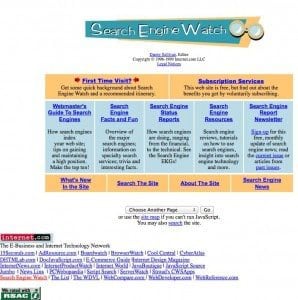Today is Thursday, and every Thursday I try to feature one search engine or search engine website. Today, because of the official announcement that Danny Goodwin is leaving Search Engine Watch, I thought I would feature Search Engine Watch.
Let’s take a look at what Search Engine Watch looked like back when Danny Sullivan owned and operated it, back in 1999:
SEW was a part of Internet.com, and Danny Sullivan was the editor. In today’s post, Danny Goodwin noted in his comments on the Webcology radio program that Search Engine Watch was considered to be dead when Danny Sullivan left.
At that time, the site wasn’t really considered to be a news website. In fact, it was more about educating people about search and SEO (search engine marketing). My favorite part of that site was the “what people search for” section, which listed these resources:
Live Search Displays
WebCrawler Search Voyeur
http://webcrawler.com/SearchTicker.html
Displays real-time searches in a news ticker format. A Java-capable browser is required. Also known as the WebCrawler Search Ticker.
MetaCrawler MetaSpy
http://www.metaspy.com/
Choose to see either a filtered or non-filtered sample of top, real-time search terms from this popular meta search service. Page automatically refreshes every 15 seconds.
Magellan Search Voyeur
http://voyeur.mckinley.com/cgi-bin/voyeur.cgi
Displays a sample of recent searches. Page automatically refreshes every 15 seconds.
Ask Jeeves Peak Through The Keyhole
http://www.askjeeves.com/Peek/peek.asp?r=x
Shows 10 recent search requests, updated every 30 seconds.
But there were also some keyword research type of sites and resources, which were very helpful, as well:
Keyword Databases
GoTo.com Inventory Search
http://www.goto.com/d/about/advertisers/clienttoolkit/
This is easily the best and freshest way to find what people are searching for on the web. The link takes you to the GoTo Client Tool Kit. There, you’ll find a link called “Search Term Suggestion List.” Click on it, and a new window will open. Enter a term you wish to research, and you’ll be shown how many searches were done for that term and other terms that include it, for the previous month.
Search Spy
http://www.searchspy.com/
This is a database of search terms available for desktop use. You enter a term, and the program scans to find matches. You can sort results by count or by keyword. Data is gathered from various live search displays.
Back in 1999, you could become a website subscriber and pay to get access for more information about search. Search Engine Watch site subscribers had “access to additional information about some of these resources, including tips on how to see more terms or terms displayed faster.” The annual subscription rate was on $34!
